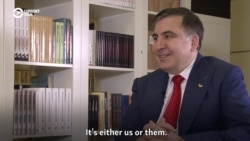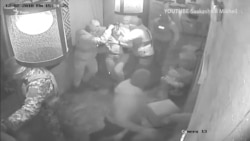Mikheil Saakashvili has vowed to push ahead with his struggle against Ukraine's leadership in defiant remarks in Warsaw, a day after he was seized in Kyiv and banished to Poland in a dramatic expulsion he has blamed on President Petro Poroshenko.
“I think Poroshenko does not have much time left," Saakashvili told Current Time TV, a project of RFE/RL in cooperation with VOA.
"We will defeat him for sure. We will prevail over him thorough the peaceful resistance of the Ukrainian people," Saakashvili told Current Time in an interview from Warsaw on February 13.
"There will be a big protest of Ukraine’s united opposition on February 18. It will be neither first nor last protest. The protests will grow eventually. In the end, they will have to surrender and retreat from power,” Saakashvili said.
"Either we beat them, or they will beat us," a defiant Saakashili told Current Time.
Earlier, at a news conference in the Polish capital, Poroshenko vowed to "break the necks of Poroshenko and [Ukrainian Prosecutor General Yuriy] Lutsenko."
"They will go to prison -- not to Europe, to Ukrainian jails," he said.
Opinion polls indicate that Saakashvili and the political movement he has created have only limited popularity in Ukraine, where parliamentary and presidential elections are due to be held in 2019.
Saakashvili, the former Georgian president who was hired by Poroshenko to head Ukraine's Odesa region but fell afoul of his friend over corruption and reforms, was detained at a Kyiv restaurant on February 12 and taken to the airport.
He was flown to Poland, the country from which he returned to Ukraine in September 2017 -- eluding a border blockade -- after being stripped of his citizenship by Poroshenko in July.
WATCH: CCTV cameras capture the dramatic scene as camouflaged men swoop into a Kyiv restaurant and detain Mikheil Saakashvili. The State Border Guard Service said he was removed from Ukraine on February 12 because he was in the country illegally.
Switching back and forth between Ukrainian, Russian, and English, Saakashvili told the news conference he will not give up on his battle against Poroshenko's government despite being outside Ukraine.
"I am free here. A free Saakashvili is more dangerous for you, Mr. Poroshenko, when I am free [and] not under pressure like I was in Ukraine," Saakashvili said.
"We will continue our fight. They will be jailed. Our movement will expand," he said, adding that he and his backers would seek to enlist the support of European Union and U.S. politicians.
Saakashvili has called on the EU and German Chancellor Angela Merkel, in particular, to support him in his anticorruption campaign against Poroshenko. But he has received little verbal backing from such European leaders.
Maja Kocijancic, spokeswoman for EU foreign policy chief Federica Mogherini, on February 13 said the EU is "following developments regarding Mr. Saakashvili," and "we expect the rule of law as well as the rights of Mr. Saakashvili to be upheld."
Saakashvili appealed again to the Ukrainian public to support his cause.
"Dear Ukrainian citizens, your country is run by liars, by people who've been lying to you and who lied to you four days ago," Saakashvili said. "We need to save Ukraine from corruption. Ukrainian citizens deserve a better life."
After Saakashvili was sent to Poland, the Ukrainian State Border Guard Service said that he "was on Ukrainian territory illegally and therefore, in compliance with all legal procedures, he was returned to the country from where he arrived."
Polish authorities said they had admitted Saakashvili at Ukraine's request and based its decision in part on the fact that the politician's wife, who is Dutch, is an EU citizen.
Saakashvili said that he did not intend to seek asylum in Poland, and vowed to eventually return to Ukraine.
"We along with our friends will organize mass rallies, protests that will become much stronger, and we will remove the oligarchs from power," Saakashvili said.
"That movement will widen and I will find the right moment to physically join it in Ukraine," he added.
Opinion polls indicate that Saakashvili and the political movement he has created have only limited popularity in Ukraine, where parliamentary and presidential elections are due to be held in 2019.
The reformist president of Georgia from 2004-13, Saakashvili lost his Georgian citizenship in 2015 when he accepted Ukrainian citizenship to become Odesa's governor.
But he resigned from the post in November 2016, accusing the government of undermining his efforts to fight corruption and carry out reforms.
A friend from their university days in Kyiv in the Soviet era, Saakashvili has become an outspoken opponent of Poroshenko -- who came to power after Moscow-friendly President Viktor Yanukovych fled amid massive protests known the Euromaidan in 2014.
In July 2017, Poroshenko stripped Saakashvili of his Ukrainian citizenship while he was abroad.
In September, Saakashvili defied a border blockade and crossed from Poland into Ukraine, where he led anti-Poroshenko protests and struggled against the state in a series of court cases until he was deported.
Ukrainian authorities accused Saakashvili of abetting an alleged "criminal group" led by Yanukovych, and claim the protests he has led are part of a Russian plot against the government in Kyiv.
Saakashvili, 50, has denied all the charges, calling them "absurd" and politically motivated.
He is also wanted in Georgia, where the government is led by the political force that pushed his United National Movement from power in 2012 parliamentary elections.
But he told Current Time that “Georgian authorities absolutely do not want me [to be extradited to Georgia], because as soon as I am back to Georgia they will be toppled. In just a week or 10 days, and I am absolutely sure about that," Saakashvili said.
In January, a Tbilisi court convicted Saakashvili of abuse of power in connection with a 2006 murder case and sentenced him in absentia to three years in prison. He denies wrongdoing and says the charges are politically motivated.







Facebook Forum